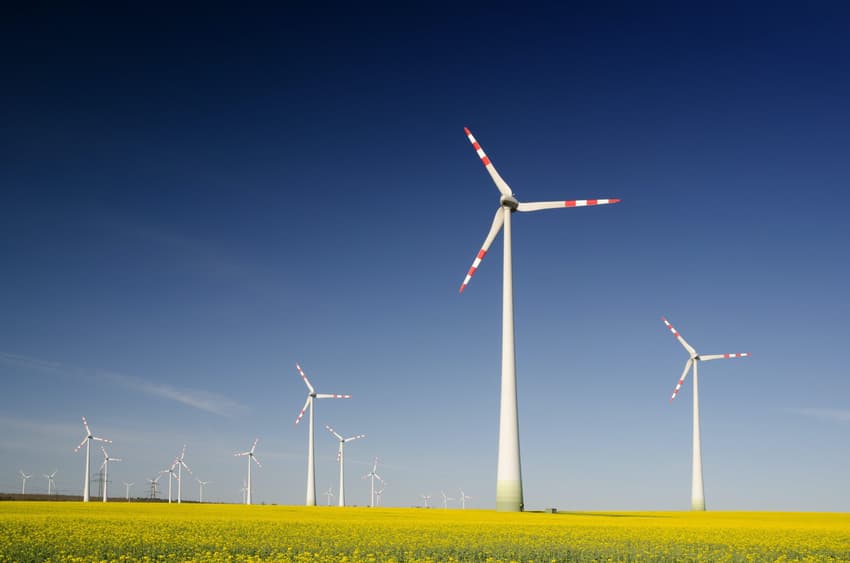Why Austria is lagging behind its EU climate targets

A report by the European Union Commission states that Austria is not on track to meet its 2040 carbon neutral targets.
Austria has an ambitious plan to become carbon neutral by 2040, but the EU Commission claims the country is not on track to meet its climate neutrality target.
"So far, reductions in greenhouse gas emissions are not on a trajectory compatible with Austria's binding target to reduce greenhouse gas emissions in sectors outside the EU Emissions Trading System by 36 per cent by 2030 compared to 2005", the report claims.
READ ALSO: How will climate change impact Austria?
Even when accounting for additional measures, the country still risks falling short of its goal by 9 percentage points, the Brussels authority announced on Monday as part of the European Semester.
One of the major challenges for Austria is reducing transport-related emissions, as the country serves as a significant transit point for transalpine road freight, the EU says.
Therefore, it recommends Austria develops further mobility solutions and alternatives to car use, citing "local buses, car sharing, soft mobility".
This includes solutions to connect remote and rural areas to public transport networks, a particularly crucial movement in a country that has several rural villages and towns - and many commuters to larger cities.
READ ALSO: How Austria plans to become carbon neutral by 2040
"Efforts to further decarbonise and electrify heavy-duty vehicles could also be stepped up to curb emissions", the Brussels commission added.
Bureaucracy halts investments
According to the report, lengthy permitting procedures and underinvestment in the electricity grid are also critical challenges for reaching renewable energy targets.
The commission mentioned that "investment in renewable energy is hampered by complex spatial planning and permitting procedures".
READ ALSO: How Vienna plans to expand its tram and park & ride systems for commuters
The process of acquiring the necessary licences for wind power projects, for example, typically takes 6.3 years, according to the report.
This is due to the bureaucracy involved in the division of powers between the federal and regional governments and partly due to staffing problems.
According to the EU commission, the country needs to invest an estimated € 18bn in accommodating the planned expansion of renewable power generation.
Comments
See Also
Austria has an ambitious plan to become carbon neutral by 2040, but the EU Commission claims the country is not on track to meet its climate neutrality target.
"So far, reductions in greenhouse gas emissions are not on a trajectory compatible with Austria's binding target to reduce greenhouse gas emissions in sectors outside the EU Emissions Trading System by 36 per cent by 2030 compared to 2005", the report claims.
READ ALSO: How will climate change impact Austria?
Even when accounting for additional measures, the country still risks falling short of its goal by 9 percentage points, the Brussels authority announced on Monday as part of the European Semester.
One of the major challenges for Austria is reducing transport-related emissions, as the country serves as a significant transit point for transalpine road freight, the EU says.
Therefore, it recommends Austria develops further mobility solutions and alternatives to car use, citing "local buses, car sharing, soft mobility".
This includes solutions to connect remote and rural areas to public transport networks, a particularly crucial movement in a country that has several rural villages and towns - and many commuters to larger cities.
READ ALSO: How Austria plans to become carbon neutral by 2040
"Efforts to further decarbonise and electrify heavy-duty vehicles could also be stepped up to curb emissions", the Brussels commission added.
Bureaucracy halts investments
According to the report, lengthy permitting procedures and underinvestment in the electricity grid are also critical challenges for reaching renewable energy targets.
The commission mentioned that "investment in renewable energy is hampered by complex spatial planning and permitting procedures".
READ ALSO: How Vienna plans to expand its tram and park & ride systems for commuters
The process of acquiring the necessary licences for wind power projects, for example, typically takes 6.3 years, according to the report.
This is due to the bureaucracy involved in the division of powers between the federal and regional governments and partly due to staffing problems.
According to the EU commission, the country needs to invest an estimated € 18bn in accommodating the planned expansion of renewable power generation.
Join the conversation in our comments section below. Share your own views and experience and if you have a question or suggestion for our journalists then email us at [email protected].
Please keep comments civil, constructive and on topic – and make sure to read our terms of use before getting involved.
Please log in here to leave a comment.